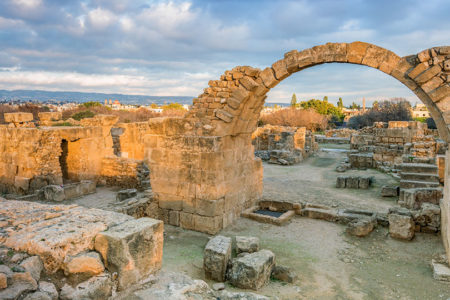One God, Three Entities Part Three
The Old Testament often describes people’s encounters with the Lord in human form and how those experiences helped them come to know Him on a personal basis. Examining some of those passages can help us know the godly entity who revealed Himself to these ancient saints, speaking to them face-to-face, as a man speaks to his friend.
God and Abram
The Lᴏʀᴅ appeared to Abram and said to him, “I am Almighty God; walk before Me and be blameless” (Gen. 17:1).
The Lord appeared to Abram (later called Abraham) and called Himself El Shaddai (English, “almighty” or “all sufficient”). The Lord was about to make a covenant with Abram in which He would promise to give him many descendants, to be His God and the God of his descendants, and to protect his descendants and give them the land of Canaan for an everlasting inheritance.
Abram understood that it was God—in bodily form—who stood before him, and he fell on his face (v. 3). Scripture describes the encounter as a real, face-to-face event, not as a dream or vision. Also important: Abram was still alive afterward.
The Lord presented Himself as El Shaddai because of the great significance of this name. The dot in the Hebrew letter d doubles the letter. El means “God” in Hebrew. The root of the word Shaddai is shdd and means “victorious and assertive.” So El Shaddai means, “I am the Lord who is victorious and the One whom all are to fear and obey.”
However, since the second letter d is silent, the word sounds like shadai, which comes from shad, the Hebrew word for “breast.” Therefore, El Shaddai sounds like the God who provides all our needs, just as mother’s milk provides every need of a newborn. God’s message to Abraham and to us is that He is almighty. He can provide for all of our needs. We must trust Him, believe in Him, walk in holiness and purity before Him, and present all our needs to Him. Our lives depend on Him.
The name El Shaddai appears 48 times in the Old Testament, 31 times in Job alone. And every time it appears, it refers to the godly entity that men are able to see face-to-face.
God and Jacob
Then God appeared to Jacob again, when he came from Padan Aram, and blessed him. And God said to him, “Your name is Jacob; your name shall not be called Jacob anymore, but Israel shall be your name.” So He called his name Israel. Also God said to him: “I am God Almighty. Be fruitful and multiply; a nation and a company of nations shall proceed from you, and kings shall come from your body. The land which I gave Abraham and Isaac I give to you; and to your descendants after you I give this land.” Then God went up from him in the place where He talked with him. So Jacob set up a pillar in the place where He talked with him,…and Jacob called the name of the place where God spoke with him, Bethel (35:9–15).
Jacob described his encounter with El Shaddai. The blessings he detailed are similar to the promises El Shaddai gave Abraham in Genesis 17. The Lord gave Jacob the same blessings to show us that He will fulfill all the promises He gave Abraham through Jacob and his seed. Jacob identified El Shaddai with God Himself. (See also Genesis 28:2–5; 48:3–4.)
God and Moses
And God spoke to Moses and said to him: “I am the Lᴏʀᴅ. I appeared to Abraham, to Isaac, and to Jacob, as God Almighty, but by My name Lᴏʀᴅ I was not known to them” (Ex. 6:2–3).
God clearly was telling Moses, “When I appeared to your forefathers, I revealed Myself to them as El Shaddai, the entity they can see and still live.” This passage sheds light on Exodus 33:10–11 where Moses met the Lord face-to-face but was not allowed to see the face of the other entity (vv. 19–20).
According to the Lord’s words, El Shaddai is one of the entities that compose the Godhead and is the One whom men are allowed to see face-to-face.
How Did El Shaddai Appear?
According to Genesis 18, El Shaddai appeared as an ordinary man. Genesis 18:1–2 prepares us for the revelation of the Lord to Abraham by the terebinth trees of Mamre in Hebron (cf. 13:18). Abraham was sitting at his tent door in the heat of the day when he saw three men coming toward him. He ran to them and bowed.
Abraham spoke to one of the men: “My Lord, if I have now found favor in Your sight, do not pass on by Your servant” (v. 3). The structure of the Hebrew text makes it clear that Abraham addressed one of the three as Adonai. The word Adonai is presented in plural, masculine form and serves as an expression of reverence. However, the rest of the verse indicates that the word refers to the Lord. Abraham said to Him, “If I have now found favor in Your sight.” The words Your sight are masculine singular, not plural, indicating that Abraham was speaking to the Lord Himself. Abraham saw Him face-to-face and lived; therefore, the person he saw was El Shaddai. El Shaddai appeared to Abraham as a man, like any other man.
The rest of the encounter reinforces the argument that the Lord appeared to Abraham in human form. In verse 10 the Lord spoke to Abraham and promised him that Sarah would give birth to a son. Sarah heard the promise while inside the tent and laughed “within herself” (v. 12). In other words, she laughed in her heart, rather than aloud. Sarah knew she was far too old to bear children and that her husband, too, was very old. But she did not know that it was God speaking to Abraham.
The fulfillment of such a promise would involve a great miracle; and since Sarah was unaware that one of the three was the Lord Himself, His words sounded like a joke to her.(Scripture nowhere says the Lord also revealed Himself to her face-to-face.)
Then the Lord asked Abraham, “Why did Sarah laugh?…Is anything too hard for the Lᴏʀᴅ? At the appointed time I will return to you…and Sarah shall have a son” (vv. 13–14).
In verse 15 Sarah denied that she laughed. But the Lord knows what is in our hearts and therefore said to Sarah decisively, “But you did laugh!” In other words, “You doubted my promise.”
“You laughed” in Hebrew is tsakhakt. Therefore, the name of their son became Yitskhak (Isaac, also spelled Yitzhak in English), meaning “will laugh.”
After the Lord and the two men who came with Him finished eating, they arose and looked toward Sodom. The Lord said He had come down to examine the deeds of the inhabitants of Sodom and Gomorrah (vv. 16–21). The men went to Sodom, while Abraham still stood before the Lord. (A similar story is documented in Genesis 11:5.)
After the two men departed, the famous negotiations began between the Lord and Abraham over saving the righteous of Sodom. These end with the verse, “So the Lᴏʀᴅ went His way as soon as He had finished speaking with Abraham; and Abraham returned to his place” (v. 33).
The two men who left Abraham and went to Sodom were angels sent to save Lot and his family from the destruction the Lord was about to rain on the sinful cities of Sodom and Gomorrah. The word angel does not always describe a winged image; it usually refers to a messenger.
Unfortunately, rabbinical Judaism does not take a Scriptural stance regarding the identity of Abraham’s important visitor. It maintains the position that all three men who visited Abraham were angels.
This explanation does not follow God’s Word. The Word teaches clearly that El Shaddai, the godly entity whom people are allowed to see, appeared to Abraham in the form of a man. Readers must decide to whom they should listen: the wisdom of men or the explicit Word of God.







